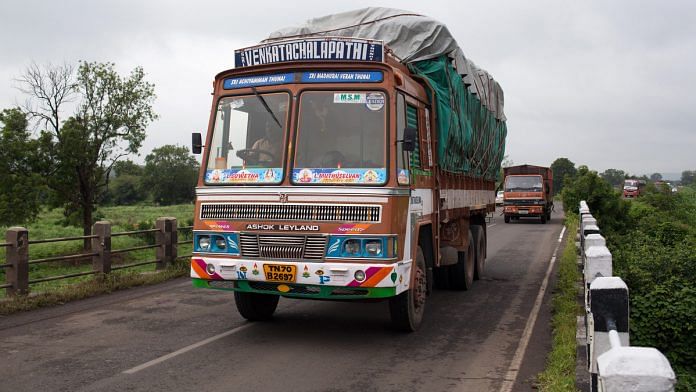Singapore: The world’s biggest lockdown has brought transportation of goods in India to a near halt, even though the federal government has exempted the sector from restrictions to halt the spread of coronavirus.
Daily movement of trucks has collapsed to less than 10% of normal levels, according to All India Motor Transport Congress, an umbrella body of goods vehicle operators representing about 10 million truckers. Road transport accounts for about 60% of freight traffic in India and 87% of its passenger traffic, according to the Ministry of Road Transport and Highways.
Trucking has emerged as a major choke-point in global supply chains for everything from food to medical supplies as governments take stringent steps to contain the pandemic, restricting the movement of vehicles and people to drive them. The collapse in India, where Prime Minister Narendra Modi imposed a three-week lockdown on the nation’s 1.3 billion people March 25, is a harbinger of the damage the measures are wreaking on the economy amid forecasts the country could see its first contraction in at least two decades.
“Though the government has allowed movement of both essential and non-essential goods, the situation is very different at the ground level,” said Naveen Kumar Gupta, secretary general of AIMTC, the largest grouping of transporters in India.
The transport of goods by road was included as one of the essential services exempt from restrictions but the government is making frequent clarifications, causing confusion on the ground, according to the organization’s president, Kultaran Singh Atwal. That’s just made worse by the time it takes for the latest directives to trickle down to officials enforcing the rules, he said.
One haulage company that’s a member of AIMTC had 20 trucks stranded in northern India, according to Gupta. Officials were stopping the vehicles at every checkpoint just a few kilometers apart. They were only allowed to cross the provincial border when the owner went to see the officials in person and showed them several government circulars and notifications, he said.
A spokesman for the transport ministry couldn’t immediately comment.
Also read: No fixed list, decide what food & groceries you want exempt from lockdown, MHA tells states
There are some signs of improvement, though. The movement of trucks at ports is easing after efforts taken to restore operations and maintain critical cargo shipments, Gupta said. Traffic to and from ports is about 50% of normal levels, he said, though labor constraints could be a future setback.
The decline in road transport is another major major drain on fuel demand in the world’s third biggest oil market, which has already been hit by the collapse in air travel. Diesel and gasoline sales in March by India’s three biggest state-run fuel retailers shrank by an estimated 26% and 17%, respectively, and the lockdown only came into effect at the end of the month. Jet fuel sales plunged 33%.
Limited freight activities will drag diesel demand to a 15-year low of 680,000 barrels per day in April, according to Senthil Kumaran, an oil markets consultant at Facts Global Energy. “The nationwide lockdown has completely halted industrial activities, thereby resulting in a sharp pullback in freight movements country-wide,” he said.
One of the major problems facing truckers is loading and unloading because of a shortage of labor, according to AIMTC. And with the lockdown shutting highway food establishments and workshops, truckers can’t get the services they need even if they are on the road.
“So, even if you allow movement of goods, the supply chain cannot be restored to full normalcy,” Gupta said. “Piecemeal opening of supply chain will not work.” -Bloomberg
Also read: Between locked down cities and distant homes, migrants lost their way in own country




Best knownable details tanks . Theprint.in